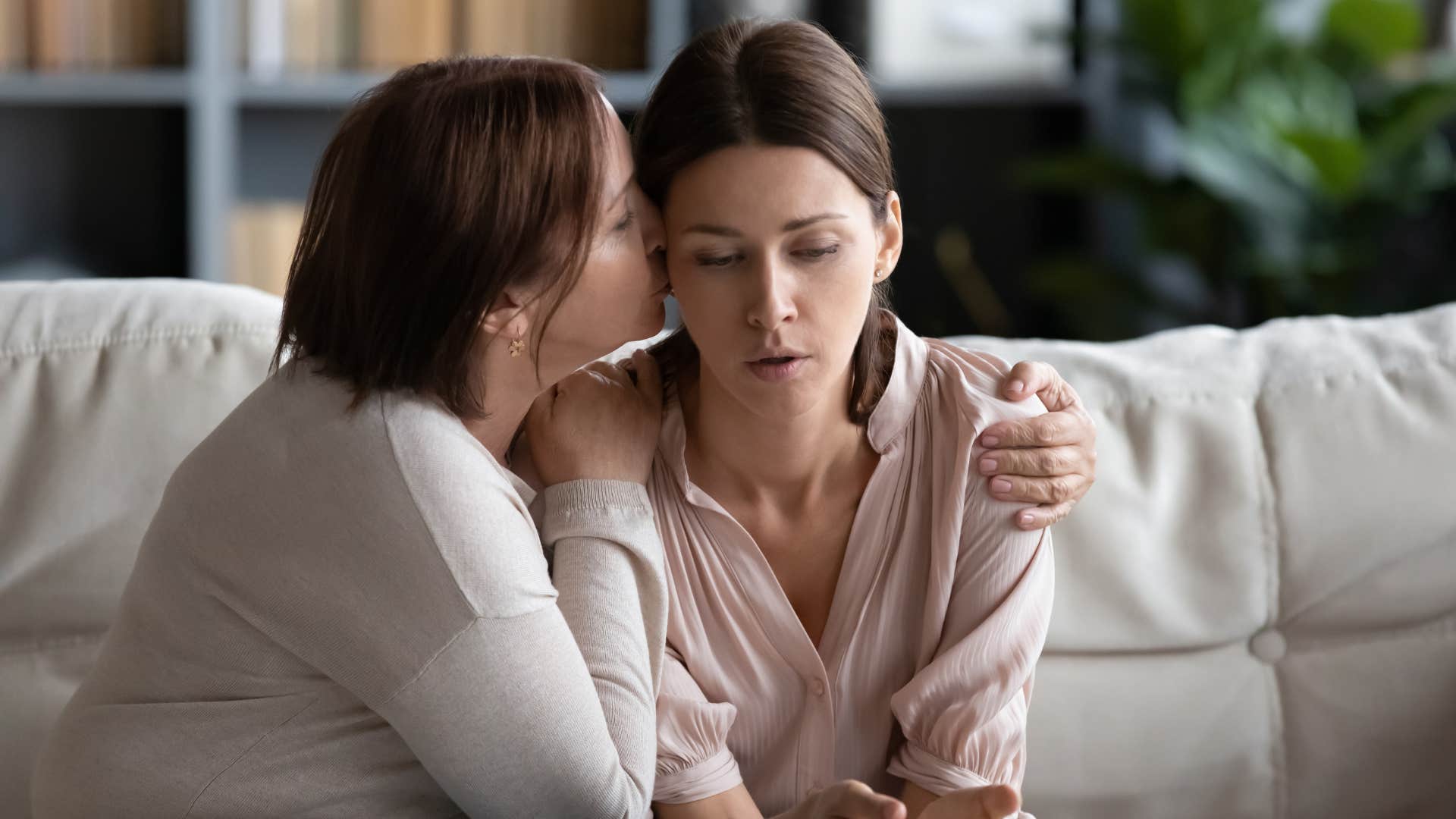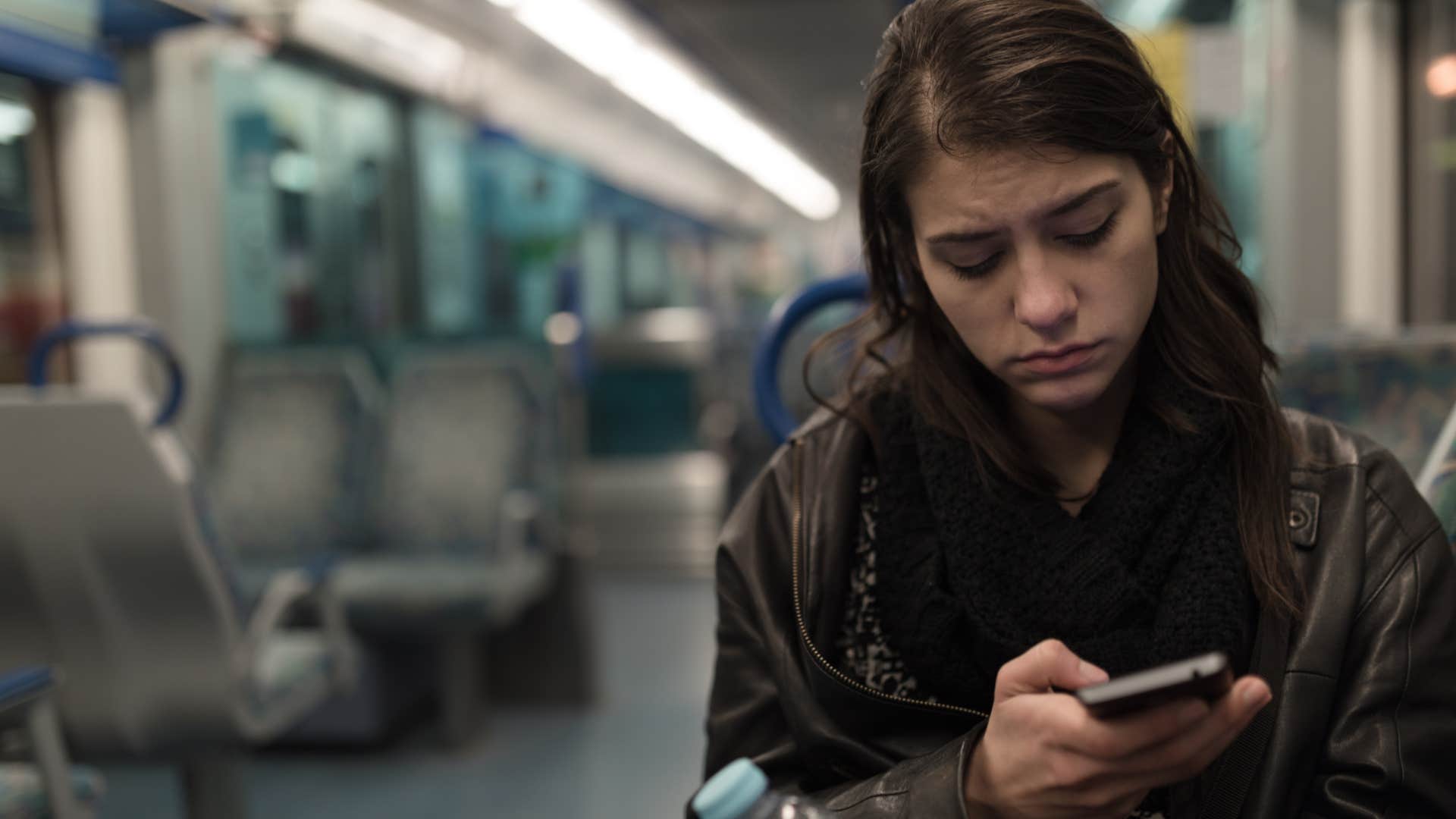11 Signs Good Parents Often Miss When Their Adult Children Are Struggling
Parents can't shield their kids from their struggles, but they can always be there to support them.
 fizkes | Shutterstock
fizkes | Shutterstock Even the best parents can't be "perfect" all the time, if that standard even exists. Especially when navigating a relationship with your children into adulthood, life gets in the way — people lose their jobs, run into financial hardships, and battle their own internal turmoil that's largely impossible to recognize from the outside.
However, there are certain signs good parents often miss when their adult children are struggling that could give them the opportunity to support their kids during their toughest moments.
Here are 11 signs good parents often miss when their adult children are struggling
1. They stop regularly texting and calling
 Fizkes | Shutterstock.com
Fizkes | Shutterstock.com
While isolation from parents is a common theme in adult children coping with unresolved childhood trauma, according to the Newport Institute, it can also be an alarming sign of emotional distress in healthy familial dynamics. Especially for families not dealing with parental estrangement or resentful adult children, recognizing these isolating tendencies can help parents to better support their kids.
If you're not talking or texting with your adult children as often as you normally would, consider it a sign they might be isolating themselves from having to deal with and verbalize confusing and uncomfortable emotions. Many people retreat from their relationships when they're unsure of how to cope with similar experiences instead of embracing discomfort.
2. They complain about physical illness more often
 Fizkes | Shutterstock.com
Fizkes | Shutterstock.com
Many adult children struggle with "somatization" in their lives, an experience that the book "Trauma-Informed Care in Behavioral Health Services" explains as the tendency for people to prioritize or focus on their physical ailments to express their emotional distress or struggle. By seeking comfort or support for a visible illness or physical struggle, they can partially address the isolating nature of their emotional distress and its consequences.
If you're noticing your child is consistently complaining of physical sickness, sometimes without any outward symptoms, make sure you create space for them to voice their emotions and seek help with you when they're ready. Sometimes, parents just have to open the door to vulnerability before their adult children feel comfortable entering.
3. Their appearance or hygiene has drastically changed
 Krakenimages.com | Shutterstock.com
Krakenimages.com | Shutterstock.com
A study published by Cambridge University Press revealed that people struggling with their mental health or a psychiatric disorder are more likely to consistently change their appearance than their neurotypical peers.
Argued to be a "visible expression" of inward emotional distress or an isolation from reality, these changes to appearance and hygiene in adult children can be one of the first signs good parents often miss when their adult children are struggling.
4. They struggle to express their emotions
 Prostock-studio | Shutterstock.com
Prostock-studio | Shutterstock.com
Many people retreat from their relationships in an effort to avoid talking about or confronting their difficult internal turmoil and emotions. It's more comfortable to self-soothe in private, oftentimes with unhealthy habits, than to embrace vulnerability with people you're unsure will empathize or support you.
Great parents may be willing and able to support their adult children through these difficult and challenging times, but haven't done a great job at reminding them that they're available to. If your adult child is pulling away, unsure about sharing the emotions and experiences they've been keen to discuss in the past, consider reminding them that you're always available to listen without unprompted advice or judgment.
5. They lose interest in their typical hobbies or activities
 Eldar Nurkovic | Shutterstock.com
Eldar Nurkovic | Shutterstock.com
When people feel disconnected from their relationships and realities, they tend to also give up on pursuing the passion projects and hobbies that typically fulfill them. According to clinical hypnotherapist and spiritual life coach Keya Murthy, these kinds of creative ventures and interests help to craft people's identities and can be incredibly impactful as de-stressing practices and for building confidence in people's everyday lives.
If you're noticing, as a parent, that your adult child has stopped posting or talking about these hobbies, figure out why. Have they creatively shifted in their interests? Or are they isolating themselves from a grounded sense of self-awareness and assuredness?
6. They have an inconsistent routine
 Lysenko Andrii | Shutterstock.com
Lysenko Andrii | Shutterstock.com
While it's likely difficult for parents of adult children to get insights into their routines, there are some ways that this shift towards an inconsistent regime could be a sign that they're struggling. According to clinical psychologist and professor Sabrina Romanoff, PsyD, signs of emotional distress or an upcoming emotional breakdown in the people around us can be unsuspecting, oftentimes characterized by subtle changes in behavior and an isolating shift away from their typical relationships, hobbies, and routines.
If you're consistently taking note of odd routine shifts in your adult child — from late-night text messages to a shift away from their daily schedule and activities — consider that a warning sign that they're struggling with something and feeling the need to cope by isolating themselves from normalcy.
7. They seem overly critical of themselves
 ViDI Studio | Shutterstock.com
ViDI Studio | Shutterstock.com
Many people struggling with internal anxiety, turmoil, or depression tend to be hyper-critical of themselves, especially around others. Whether they're subconsciously looking for support or not, they tend to be experiencing intense emotions of guilt or resentment that urge them to cope with this harmful behavior.
Good parents may pick up on this behavior, especially if it's new, before other signs, giving them space to reassure and redirect their negative energy away from themselves.
8. They openly adopt unhealthy vices
 TetianaKtv | Shutterstock.com
TetianaKtv | Shutterstock.com
According to a study from SSM - Population Health, there's an intrinsic link between loneliness and high-risk behaviors, as people experiencing emotional turmoil and isolation yearn for a way to cope with their emotions, sometimes at their own expense.
While it might come across subtly, parents who notice behavioral shifts or the presence of unhealthy vices in their adult children's lives may not always be able to directly intervene, but they can help to support and promote healthy connection in their routines. Even if it's providing a listening ear, introducing community events into their lives, or presenting healthier coping mechanisms in their lives, they can do their best to support, while still maintaining their own healthy boundaries.
9. They seem more nervous than normal
 DimaBerlin | Shutterstock.com
DimaBerlin | Shutterstock.com
According to the American Psychiatric Association, one warning sign of someone struggling with their mental health is heightened nervousness. They may be more critical of others and themselves, paranoid about the people around them, and even more anxious than normal about typical life struggles and situations.
While parents of adult children might not recognize this sign immediately, especially if they're primarily communicating online, it's something to keep in mind when in alignment with other unsettling in-person signs.
10. Their relationships seem to be struggling or ending
 People Images Yuri A | Shutterstock.com
People Images Yuri A | Shutterstock.com
People who are struggling internally tend to inadvertently fail to show up healthily in their relationships — whether they're platonic, professional, or romantic. With all their energy and time focused on mediating the consequences of uncomfortable and unresolved inner turmoil, they lose touch with the important aspects of their other connections like genuine support, open communication, and honesty.
As a parent, you might notice this sign before others, especially if they seem to be complaining about or losing several relationships in their lives at a time. Consider the ways you can support them through this difficult time and even serve as a sounding board for the concerns and emotions they didn't feel comfortable enough to share with others in their inner circle.
11. They struggle with focus and concentration
 MAYA LAB | Shutterstock.com
MAYA LAB | Shutterstock.com
If good parents are only seeing their adult children occasionally or conversing with them over the phone, noticing their struggles with focus or concentration can be a sign they're struggling emotionally. According to research published in the Journal of Experimental Psychology, many people battling internal and emotional turmoil may be spending most of their energy repressing those uncomfortable emotions, especially when interacting with others.
That brain fog, sparked by anxiety or heavy emotional burdens, can spark a cycle of confusion that seeps into their daily interactions, productivity, and general mood.
Zayda Slabbekoorn is a staff writer with a bachelor's degree in social relations & policy and gender studies who focuses on psychology, relationships, self-help, and human interest stories.

